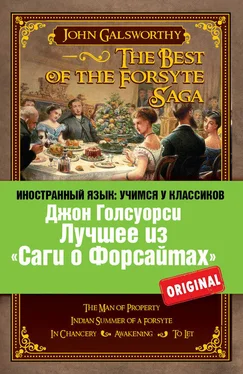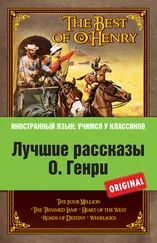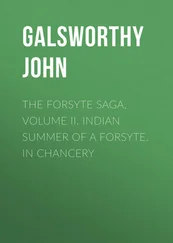Bosinney spun round.
“Who are you? What do you want?”
George could have stood it well enough in the light of the gas lamps, in the light of that everyday world of which he was so hardy a connoisseur; but in this fog, where all was gloomy and unreal, where nothing had that matter-of-fact value associated by Forsytes with earth, he was a victim to strange qualms, and as he tried to stare back into the eyes of this maniac, he thought:
‘If I see a bobby, I’ll hand him over; he’s not fit to be at large.’
But waiting for no answer, Bosinney strode off into the fog, and George followed, keeping perhaps a little further off, yet more than ever set on tracking him down.
‘He can’t go on long like this,’ he thought. ‘It’s God’s own miracle he’s not been run over already.’ He brooded no more on policemen, a sportsman’s sacred fire alive again within him.
Into a denser gloom than ever Bosinney held on at a furious pace; but his pursuer perceived more method in his madness – he was clearly making his way westwards.
‘He’s really going for Soames!’ thought George. The idea was attractive. It would be a sporting end to such a chase. He had always disliked his cousin.
The shaft of a passing cab brushed against his shoulder and made him leap aside. He did not intend to be killed for the Buccaneer, or anyone. Yet, with hereditary tenacity, he stuck to the trail through vapour that blotted out everything but the shadow of the hunted man and the dim moon of the nearest lamp.
Then suddenly, with the instinct of a town-stroller, George knew himself to be in Piccadilly. Here he could find his way blindfold; and freed from the strain of geographical uncertainty, his mind returned to Bosinney’s trouble.
Down the long avenue of his man-about-town experience, bursting, as it were, through a smirch of doubtful amours, there stalked to him a memory of his youth. A memory, poignant still, that brought the scent of hay, the gleam of moonlight, a summer magic, into the reek and blackness of this London fog – the memory of a night when in the darkest shadow of a lawn he had overheard from a woman’s lips that he was not her sole possessor. And for a moment George walked no longer in black Piccadilly, but lay again, with hell in his heart, and his face to the sweet-smelling, dewy grass, in the long shadow of poplars that hid the moon.
A longing seized him to throw his arm round the Buccaneer, and say, “Come, old boy. Time cures all. Let’s go and drink it off!”
But a voice yelled at him, and he started back. A cab rolled out of blackness, and into blackness disappeared. And suddenly George perceived that he had lost Bosinney. He ran forward and back, felt his heart clutched by a sickening fear, the dark fear which lives in the wings of the fog. Perspiration started out on his brow. He stood quite still, listening with all his might.
“And then,” as he confided to Dartie the same evening in the course of a game of billiards at the Red Pottle, “I lost him.”
Dartie twirled complacently at his dark moustache. He had just put together a neat break of twenty-three, – failing at a ‘Jenny.’ “And who was she?” he asked.
George looked slowly at the ‘man of the world’s’ fattish, sallow face, and a little grim smile lurked about the curves of his cheeks and his heavy-lidded eyes.
‘No, no, my fine fellow,’ he thought, ‘I’m not going to tell you.’ For though he mixed with Dartie a good deal, he thought him a bit of a cad.
“Oh, some little love-lady or other,” he said, and chalked his cue.
“A love-lady!” exclaimed Dartie – he used a more figurative expression. “I made sure it was our friend Soa….”
“Did you?” said George curtly. “Then damme you’ve made an error.”
He missed his shot. He was careful not to allude to the subject again till, towards eleven o’clock, having, in his poetic phraseology, ‘looked upon the drink when it was yellow,’ he drew aside the blind, and gazed out into the street. The murky blackness of the fog was but faintly broken by the lamps of the ‘Red Pottle,’ and no shape of mortal man or thing was in sight.
“I can’t help thinking of that poor Buccaneer,” he said. “He may be wandering out there now in that fog. If he’s not a corpse,” he added with strange dejection.
“Corpse!” said Dartie, in whom the recollection of his defeat at Richmond flared up. “He’s all right. Ten to one if he wasn’t tight!”
George turned on him, looking really formidable, with a sort of savage gloom on his big face.
“Dry up!” he said. “Don’t I tell you he’s ‘taken the knock!” ’
In the morning of his case, which was second in the list, Soames was again obliged to start without seeing Irene, and it was just as well, for he had not as yet made up his mind what attitude to adopt towards her.
He had been requested to be in court by half-past ten, to provide against the event of the first action (a breach of promise) collapsing, which however it did not, both sides showing a courage that afforded Waterbuck, Q.C., an opportunity for improving his already great reputation in this class of case. He was opposed by Ram, the other celebrated breach of promise man. It was a battle of giants.
The court delivered judgment just before the luncheon interval. The jury left the box for good, and Soames went out to get something to eat. He met James standing at the little luncheon-bar, like a pelican in the wilderness of the galleries, bent over a sandwich with a glass of sherry before him. The spacious emptiness of the great central hall, over which father and son brooded as they stood together, was marred now and then for a fleeting moment by barristers in wig and gown hurriedly bolting across, by an occasional old lady or rusty-coated man, looking up in a frightened way, and by two persons, bolder than their generation, seated in an embrasure arguing. The sound of their voices arose, together with a scent as of neglected wells, which, mingling with the odour of the galleries, combined to form the savour, like nothing but the emanation of a refined cheese, so indissolubly connected with the administration of British Justice.
It was not long before James addressed his son.
“When’s your case coming on? I suppose it’ll be on directly. I shouldn’t wonder if this Bosinney’d say anything; I should think he’d have to. He’ll go bankrupt if it goes against him.” He took a large bite at his sandwich and a mouthful of sherry. “Your mother,” he said, “wants you and Irene to come and dine to-night.”
A chill smile played round Soames’ lips; he looked back at his father. Anyone who had seen the look, cold and furtive, thus interchanged, might have been pardoned for not appreciating the real understanding between them. James finished his sherry at a draught.
“How much?” he asked.
On returning to the court Soames took at once his rightful seat on the front bench beside his solicitor. He ascertained where his father was seated with a glance so sidelong as to commit nobody.
James, sitting back with his hands clasped over the handle of his umbrella, was brooding on the end of the bench immediately behind counsel, whence he could get away at once when the case was over. He considered Bosinney’s conduct in every way outrageous, but he did not wish to run up against him, feeling that the meeting would be awkward.
Next to the Divorce Court, this court was, perhaps, the favourite emporium of justice, libel, breach of promise, and other commercial actions being frequently decided there. Quite a sprinkling of persons unconnected with the law occupied the back benches, and the hat of a woman or two could be seen in the gallery.
Читать дальше
Конец ознакомительного отрывка
Купить книгу

![Автор неизвестен Эпосы, мифы, легенды и сказания - Самые лучшие английские легенды [The Best English Legends]](/books/34729/avtor-neizvesten-eposy-mify-legendy-i-skazaniya-s-thumb.webp)










